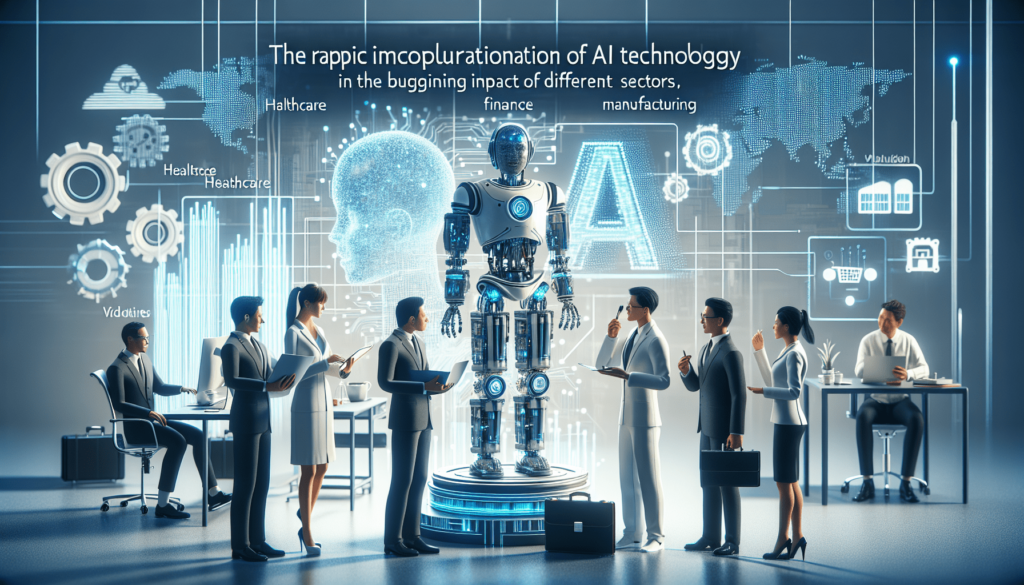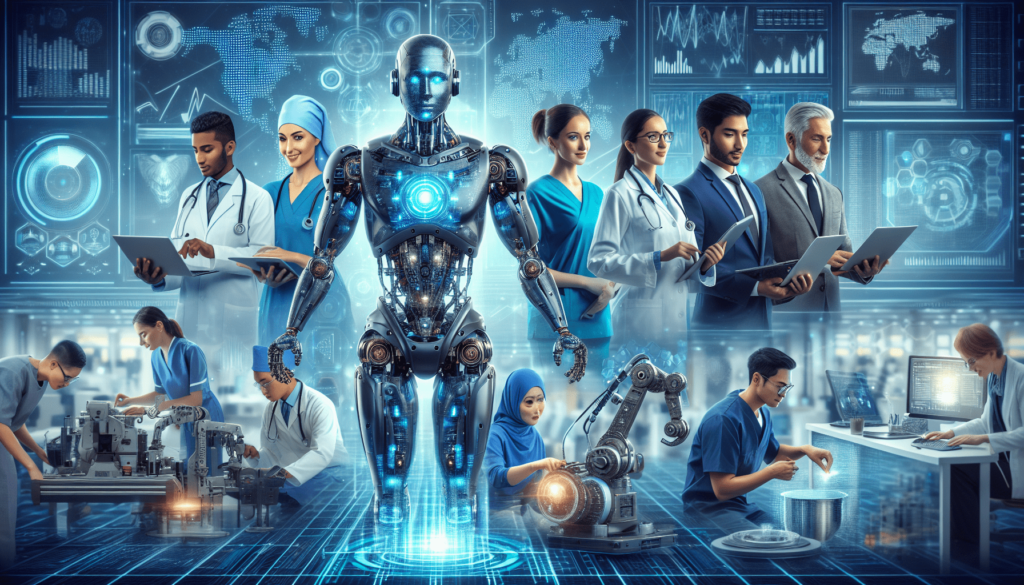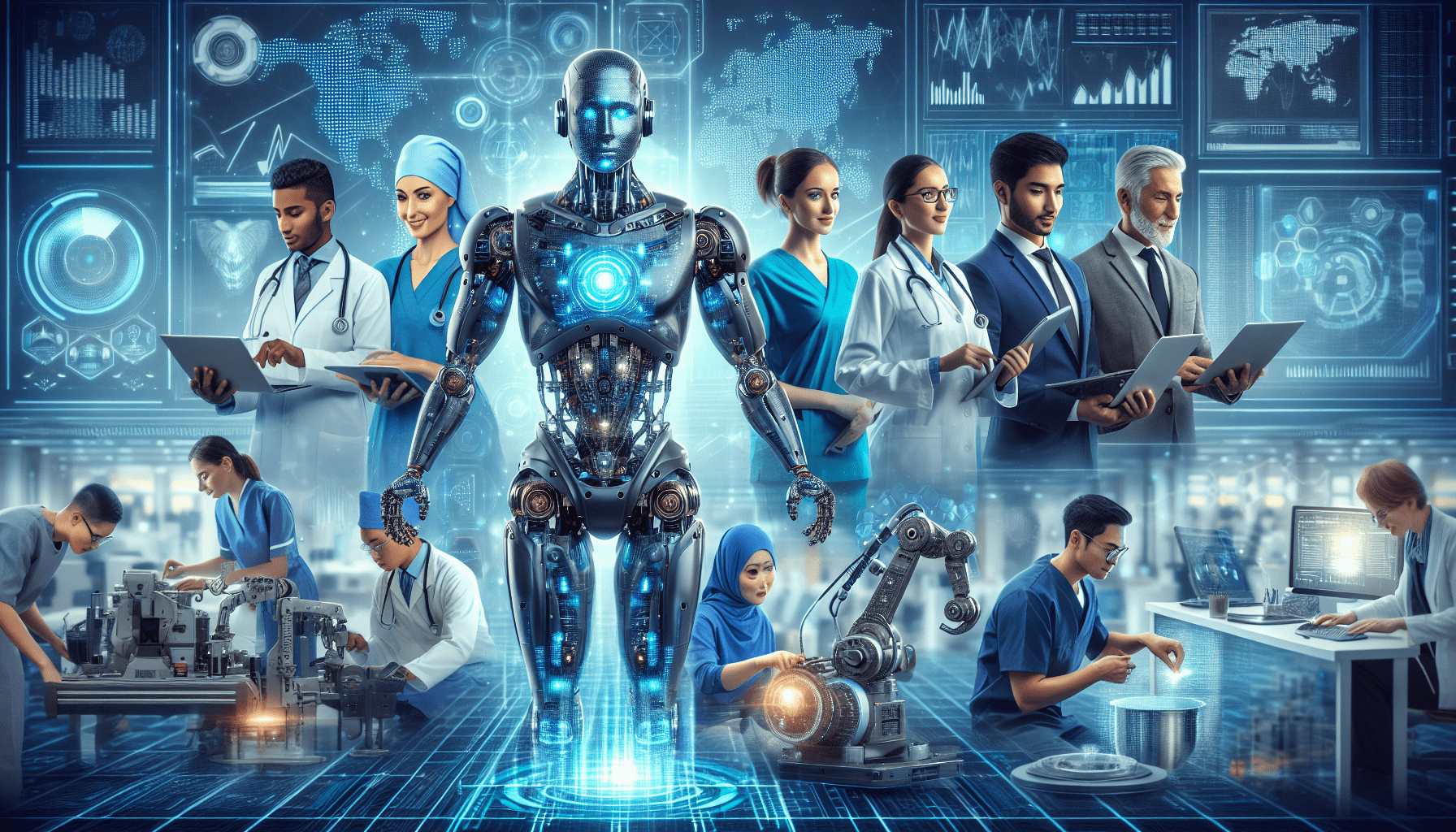In today’s rapidly evolving technological landscape, artificial intelligence (AI) has become increasingly prevalent across various industries. From healthcare to finance, the integration of AI has allowed for enhanced efficiency, improved decision-making, and the creation of innovative solutions. As businesses strive to remain competitive in the digital age, the adoption of AI has become crucial, marking a significant shift in the way industries operate. Let’s explore the fastest growing sectors that have wholeheartedly embraced AI and the tangible impact it has had on their growth and success.
Healthcare
In the healthcare industry, the use of artificial intelligence (AI) has been instrumental in improving diagnostics and treatment. AI algorithms can analyze a vast amount of patient data, including medical records, lab results, and imaging scans, to detect patterns and identify potential health conditions. This enables healthcare professionals to make more accurate and timely diagnoses, leading to better treatment outcomes. AI also assists in treatment planning by analyzing the effectiveness of various treatment options and providing recommendations. Moreover, AI-powered robots can assist surgeons during complex procedures, increasing surgical precision and reducing the risk of errors.
Another area where AI is making a significant impact in healthcare is streamlining administrative tasks. AI-powered software can automate and optimize processes such as appointment scheduling, medical billing, and insurance claim processing. This not only reduces the burden on administrative staff but also improves the overall efficiency of healthcare organizations. By digitizing medical records and automating documentation, AI also aids in reducing errors and ensuring that patient information is easily accessible and secure.
Enhancing patient care and experience is another key area where AI is transforming the healthcare industry. Virtual nurses and chatbots powered by AI can provide personalized care and support to patients, offering information and answering frequently asked questions. This improves accessibility to healthcare information and reduces the need for patients to wait for human assistance. AI can also be used to monitor patient data in real-time, allowing for early detection of deteriorating health conditions and prompt intervention. Furthermore, AI-driven technologies such as wearable devices and remote monitoring systems enable patients to receive continuous care and assistance even outside of healthcare facilities.
Finance
AI has found widespread adoption in the finance industry, revolutionizing various aspects of operations. Fraud detection and prevention have significantly improved with the implementation of AI algorithms. Machine learning models can analyze vast amounts of financial data to identify patterns that indicate fraudulent activities. This helps financial institutions detect and prevent fraudulent transactions, safeguarding the interests of both individuals and organizations.
Investment analysis and trading have also benefited from the use of AI. AI algorithms can analyze market trends, news articles, and historical data to identify investment opportunities and make informed trading decisions. These algorithms can quickly process large volumes of data and execute trades with accuracy and speed, resulting in optimized investment portfolios and improved returns.
Customer service and support in the finance industry have undergone a transformation with the introduction of AI-powered chatbots and virtual assistants. These AI systems can interact with customers, provide information about financial products and services, and even assist with basic financial tasks such as money transfers and account inquiries. This not only enhances customer experience but also frees up human agents to focus on complex queries and situations that require human expertise.

Retail
AI is reshaping the retail industry by optimizing various aspects of its operations. One key area where AI is making a significant impact is in inventory management. AI algorithms can analyze historical sales data, market trends, and even external factors such as weather forecasts to accurately predict demand. This allows retailers to optimize their inventory levels, reducing the risk of stockouts or overstocking. By having the right products available at the right time, retailers can improve customer satisfaction and maximize their profitability.
Personalized shopping experiences are also being enhanced through the use of AI. By analyzing customer data such as purchase history, browsing behavior, and demographics, AI can provide personalized product recommendations and offers. This not only improves customer satisfaction but also helps retailers increase sales and customer loyalty. AI-powered virtual shopping assistants can also guide customers through the shopping process, providing personalized product information and helping them find the right products based on their preferences.
Demand forecasting and pricing are other areas where AI is driving significant improvements in the retail industry. AI algorithms can analyze various data sources, including historical sales data, economic indicators, and competitor pricing, to accurately predict future demand and optimize pricing strategies. This allows retailers to set competitive prices and maximize their revenue while taking into account market dynamics and customer behavior.
Manufacturing
In the manufacturing industry, AI is revolutionizing production processes and driving improvements in quality control. By using AI algorithms, manufacturers can optimize production schedules, reduce downtime, and improve overall efficiency. AI can analyze data from sensors and production equipment to identify potential bottlenecks and inefficiencies in the production process. This enables manufacturers to take proactive measures to optimize production flows and minimize disruptions, resulting in increased productivity and reduced costs.
Quality control and defect detection are critical aspects of manufacturing, and AI is playing a crucial role in improving these areas. AI-powered systems can analyze images, videos, and sensor data to identify defects and anomalies in real-time. This allows manufacturers to detect quality issues early in the production process, minimizing product defects and reducing waste. By improving quality control, AI helps manufacturers maintain high product standards and customer satisfaction.
Predictive maintenance is another area where AI is driving significant improvements in the manufacturing industry. By analyzing data from sensors and machine logs, AI algorithms can predict equipment failures before they happen. This allows manufacturers to schedule maintenance activities proactively, preventing unplanned downtime and reducing repair costs. Predictive maintenance also helps extend the lifespan of equipment, optimizing asset utilization and reducing maintenance expenses.

Transportation
The transportation industry is embracing AI to transform various aspects of its operations. One noticeable area is the development of autonomous vehicles. AI algorithms and technologies such as computer vision and machine learning are being used to develop self-driving cars, trucks, and drones. Autonomous vehicles have the potential to significantly improve transportation safety, reduce traffic congestion, and enhance fuel efficiency. With AI-powered systems, vehicles can perceive their surroundings, make complex decisions, and navigate through various traffic scenarios.
Route optimization and traffic management are other key areas where AI is making a substantial impact in the transportation industry. AI algorithms can analyze real-time traffic data, historical patterns, and weather conditions to optimize route planning and traffic flow. By considering factors such as travel time, fuel efficiency, and congestion levels, AI can provide drivers and logistics companies with the most efficient routes, resulting in reduced travel times and improved overall transportation logistics.
AI is also transforming supply chain management in the transportation industry. By analyzing data from various sources such as suppliers, warehouses, and transportation networks, AI algorithms can optimize supply chain operations. This includes tasks such as inventory management, demand forecasting, and delivery scheduling. By optimizing supply chain logistics, AI helps reduce operational costs, improve customer satisfaction, and enhance overall efficiency.
Customer Service
AI has revolutionized customer service by enabling the development of chatbots and virtual assistants. These AI-powered systems can assist customers with inquiries, provide product information, and resolve basic issues, reducing the need for human intervention. Chatbots can quickly respond to customer queries, provide 24/7 support, and offer personalized recommendations. With natural language processing capabilities, chatbots can understand and respond to customer requests in a conversational manner, improving the overall customer experience.
Automated customer support is another area where AI is driving significant improvements. By analyzing customer interactions, AI algorithms can identify common issues and patterns, enabling the automation of support processes. Automated responses and solutions can be provided to customers, resolving their issues efficiently and reducing the workload on human support agents. This allows organizations to handle a higher volume of customer inquiries while maintaining quality support.
Sentiment analysis is also being enhanced through AI in customer service. AI algorithms can analyze customer feedback, social media posts, and other sources of customer sentiment to understand customer satisfaction levels and identify potential areas for improvement. By monitoring customer sentiment in real-time, organizations can proactively address customer concerns and improve their products, services, and overall customer experience.
Education
AI is transforming the education industry by enabling personalized learning experiences for students. AI algorithms can analyze student data such as learning styles, preferences, and performance to tailor educational content and activities to individual needs. This allows students to learn at their own pace and in a way that suits their unique learning styles, improving engagement and knowledge retention.
Automated grading and assessment are other areas where AI is driving improvements in education. By leveraging natural language processing and machine learning, AI algorithms can automatically grade assignments and exams, providing instant feedback to students. This not only saves teachers time but also enables timely feedback, supporting student learning and growth. With AI-powered assessment systems, educators can more accurately evaluate student performance and identify areas that require additional attention or intervention.
Intelligent tutoring systems are also being developed using AI in the education industry. These systems can provide individualized instruction, adapt to student progress, and offer personalized feedback. By analyzing student interactions and performance data, AI algorithms can identify areas where students are struggling and provide targeted interventions and resources. Intelligent tutoring systems can help students overcome learning challenges, bridge knowledge gaps, and achieve better learning outcomes.
Marketing and Advertising
AI is transforming marketing and advertising by enabling targeted advertising campaigns. AI algorithms can analyze customer data, including demographics, purchase history, and online behavior, to identify target audiences and personalize advertising messages. By delivering relevant and personalized ads, organizations can increase the effectiveness of their marketing campaigns, improve customer engagement, and drive higher conversion rates.
Customer segmentation and profiling are other areas where AI is making a significant impact. AI algorithms can analyze large volumes of customer data to segment customers based on their characteristics, behavior, and preferences. This allows organizations to understand their customers better and develop targeted marketing strategies. By tailoring marketing messages and offers to specific customer segments, organizations can optimize their marketing efforts and improve overall customer satisfaction.
Real-time analytics is another area where AI is driving improvements in marketing and advertising. AI algorithms can analyze vast amounts of data from various sources, including social media, website traffic, and sales data, to provide real-time insights and analytics. This enables organizations to monitor marketing campaigns, track customer behavior, and make data-driven decisions on the fly. Real-time analytics helps organizations optimize marketing strategies, allocate resources effectively, and quickly adapt to changing market dynamics.
Cybersecurity
AI is playing a critical role in securing digital systems and protecting against various cyber threats. Threat detection and prevention have significantly improved with the use of AI algorithms. These algorithms can analyze network traffic, access logs, and user behavior to identify potential threats and anomalies. By continuously monitoring and analyzing security data, AI-powered systems can detect and respond to cyber threats in real-time, reducing the risk of security breaches and protecting sensitive information.
Anomaly detection is another area where AI is driving improvements in cybersecurity. AI algorithms can establish baselines of normal system behavior and identify deviations from these baselines that may indicate potential security breaches. By detecting anomalies in real-time, organizations can take immediate action to investigate and respond to potential security incidents. Anomaly detection helps organizations identify and mitigate security risks before they result in significant damage or data breaches.
Data protection and privacy are also crucial aspects of cybersecurity, and AI plays a vital role in ensuring their enforcement. AI algorithms can analyze and classify sensitive data, ensuring that it is appropriately protected and accessed only by authorized individuals. AI-powered systems can also detect potential privacy violations and ensure compliance with data protection regulations. By proactively protecting data and privacy, organizations can build trust with their customers and stakeholders.
Energy
The energy industry is embracing AI to optimize various aspects of its operations and improve sustainability. Smart grid management is one area where AI is making a significant impact. AI algorithms can analyze data from smart meters, power grids, and weather forecasts to optimize energy distribution, reduce energy waste, and increase grid stability. By predicting energy demand and managing supply efficiently, AI-powered systems enable the smooth operation of energy grids and promote sustainable energy consumption.
Energy consumption optimization is another key area where AI is driving improvements. AI algorithms can analyze energy consumption patterns and identify opportunities for optimizing energy usage. By suggesting energy-saving strategies and providing real-time feedback on energy consumption, AI-powered systems help individuals and organizations make informed decisions that minimize energy waste. Energy optimization not only reduces energy costs but also contributes to environmental sustainability by reducing carbon emissions.
Predictive maintenance of infrastructure is another area where AI is transforming the energy industry. By analyzing data from sensors and machine logs, AI algorithms can predict equipment failures before they occur. This allows energy companies to schedule maintenance activities proactively, minimizing downtime and reducing repair costs. Predictive maintenance helps optimize asset utilization and prolong the lifespan of energy infrastructure, resulting in improved reliability and operational efficiency.
In conclusion, across a wide range of industries, artificial intelligence is revolutionizing operations and driving improvements. Whether it’s healthcare, finance, retail, manufacturing, transportation, customer service, education, marketing and advertising, cybersecurity, or energy, AI is transforming various aspects of these industries. From improving diagnostics and treatment in healthcare to optimizing inventory management in retail, AI is enhancing efficiency, accuracy, and customer experiences. As AI continues to advance, its adoption and application in these industries will only continue to grow, leading to a more intelligent and interconnected world.
